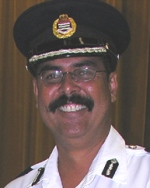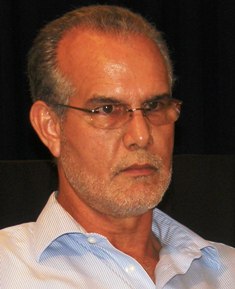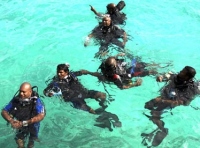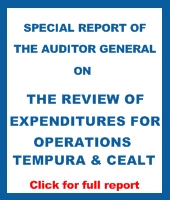Archive for October 12th, 2009

Dixon still suspended from job
 (CNS): Despite the recent acquittal of Deputy Commissioner Rudy Dixon regarding the charges brought against him relating to the Operation Tempura investigation, the police commissioner announced today that the senior cop remains on required leave pending what Baines said was the completion of disciplinary enquiries which led to this action. David Baines, who recently recruited another deputy commissioner from the UK, said that to comment further on the proceedings at this time, until the disciplinary investigations are concluded, would be unfair to Dixon.
(CNS): Despite the recent acquittal of Deputy Commissioner Rudy Dixon regarding the charges brought against him relating to the Operation Tempura investigation, the police commissioner announced today that the senior cop remains on required leave pending what Baines said was the completion of disciplinary enquiries which led to this action. David Baines, who recently recruited another deputy commissioner from the UK, said that to comment further on the proceedings at this time, until the disciplinary investigations are concluded, would be unfair to Dixon.
The original reason for Dixon’s suspension from office on 27 March 2008 is not entirely clear. When the announcement was made regarding the presence of Scotland Yard in Cayman and that three of Cayman’s top four law enforcement officers had been suspended, the governor said this was to facilitate investigations that were not related to the accusations of a corrupt relationship between Deputy Commissioner Anthony Ennis and Net News publisher Desmond Seales, but to issues that had arisen during that enquiry.
What was to become known as ‘Netnewsgate’, however, was eventually revealed to be the reason why former commissioner, Stuart Kernohan, and CS John Jones were suspended from office as a result of Bridger’s misguided belief that there had been an illegal break-in to the Net News offices sanctioned by the senior officers.
At the time the governor said: “To facilitate those inquiries I have decided to send the Police Commissioner Stuart Kernohan, Deputy Commissioner Rudolph Dixon and Detective Chief Superintendent John Jones on required leave this morning.”
Dixon was not arrested until May, in connection to the charges he was later to face over releasing people from custody and it was never made clear whether his suspension was in connection with investigations leading to those charges or to the investigations connected to Net News.
CNS understands, however, that the disciplinary action is in connection with the charges Dixon had faced and that, regardless of the not guilty verdict brought by the jury after hearing all the evidence, the deputy commissioner can still face internal disciplinary action in connection with the same issues.
Although, CNS has submitted questions regarding the recruitment of a new deputy and how that relates to Dixon’s position should he be cleared internally now as well as having been already cleared by the court, we have not yet received a response.

Marine cops clamp down on waterway offenders
(CNS): Following several reports of wave runners and vessels operating in a dangerous manner, especially in the North Sound in the Vicinity of Rum Point area, an operation was carried out by the RCIPS Marine Unit on Sunday 11 October, police said today. The RCIPS did not make any arrests but said they warned owners about potential prosecution over operating vessels in a designated swim area, wave runners exceeding 5 knots within 50 yards of a boat at anchor, within 200 yards from shore and within an Environmental Zone. Police Sergeant Clive Smith said such offences would not be tolerated by the Marine Department and offenders would be prosecuted.
“On Sunday’s in particular there are a large amount of boats that congregate at Rum Point at anchor, with hundreds of persons in the water, including young children and babies, the wake from these vessels can exceed 5 Knots. Going between these boats can cause injury or death,” he explained.
“Boats are also used for birthday parties and other celebrations where food and drinks are set out only to be turned over by some inconsiderate vessel operator approaching the area at a fast speed. The Marine Unit is requesting that all boat operators exercise safety and courtesy when approaching other vessels at anchor.” he added.
Anyone with information about crime taking place in the Cayman Islands should contact their local police station or Crime Stoppers on 800-8477 (TIPS). All persons calling Crime Stoppers remain anonymous, and are eligible for a reward of up to $1000, should their information lead to an arrest or recovery of property/drugs.

Need a tax haven? Try the US
(Forbes): The U.S. Treasury Department rails sanctimoniously against overseas tax havens and recently bullied Switzerland into naming American tax evaders at Swiss bank UBS AG. But who knew that the U.S. itself is a tax haven? That, at least, is the suggestion levelled by Mexico’s government. Much to the delight of American banks, the U.S. allows non-resident foreign nationals to park their money in U.S. bank accounts without having to pay taxes on interest or (in most cases) report it to the Internal Revenue Service.

Bridger paid over CI$500,000
 (CNS): Senior Investigating Officer of the Special Police Investigating Team was the highest paid government employee in the Cayman Islands during the time he was managing the discredited Operation Tempura investigation. According to a shocking report released today by the auditor general, Martin Bridger received almost $430,000 in salary, fees and expenses between September 2007 and the end of January 2009. Based on his average costs during those months it is estimated he received a further $90,000 before he left the island in April 2009, making a total of more than $520,000.
(CNS): Senior Investigating Officer of the Special Police Investigating Team was the highest paid government employee in the Cayman Islands during the time he was managing the discredited Operation Tempura investigation. According to a shocking report released today by the auditor general, Martin Bridger received almost $430,000 in salary, fees and expenses between September 2007 and the end of January 2009. Based on his average costs during those months it is estimated he received a further $90,000 before he left the island in April 2009, making a total of more than $520,000.
In the auditor general’s special value for money report on expenditures for Operation Tempura and Cealt, Dan Duguay and his team estimated that the investigations had cost the tax payers almost CI$7 million by June 2009, but conceded that this was merely an estimate as they were unable to gather all of the costs incurred because of the lack of financial oversight of the investigation from the start.
Moreover, Duguay confirmed that the figure does not include the $365,942 in this year’s budget appropriations, the costs of the Lyndon Martin and Rudolf Dixon trials, or any costs likely to be incurred as a result of the two law suits government is currently facing from Stuart Kernohan and Burmon Scott or any future action that may be instigated by Dixon or Martin.
The AG’s Office also said it was impossible to factor in the indirect costs relating to the investigations, as well as costs that were merely absorbed by various government departments as a result of their involvement for one reason or another. Duguay also confirmed that they did not examine any costs relating to the electronic surveillance that may or may not have been conducted. However, it is clear from the recent court cases and revelations of phone records that SPIT was tapping phones and therefore must have incurred other costs relating to that.
“The final auditing for Operation Tempura and Cealt is not done yet,” Duguay added. “We are probably still more than a year away from understanding the real costs.”
In the 25-page report Duguay states that the administration of the expenditures relating to Operation Tempura and Cealt lacked the necessary oversight and project management to ensure there was value for money for the expenditures incurred. “The lack of appropriate project management processes led to the poor management of contacts associated with both investigations,” Duguay wrote in the report.
“We also found a lack of management processes for the administration of contracts to individuals, including the contract relating to the senior investigating officer. While we have not commented on the value for money obtained for these contracts, we believe it is up to government to be accountable.”
Duguay said that because of the unique circumstances it was difficult for his office to say whether the SIO presented good value or not. “By presenting the figures we believe it is up to the people of Cayman to make a decision if they think this was good value,” he added.
Recognising the unique nature of the investigation, Duguay admits it would have been impractical to go through all of the usual tendering processes but that government should still have maintained some kind of management of how money was being spent. Moreover, the government’s auditor notes that considerable sums were used by SPIT before being given legislative approval. In other words, the money was spent before the LA had approved it in Finance Committee.
Duguay also revealed that, while SPIT consisted of up to eight members at any given time, the SIO had still contracted another outside investigation services firm – BGP Training and Consultancy, a UK consultancy comprised of former police officers and known to both Bridger and Scotland Yard’s Jonathan Yates, the top UK cop who supposedly had oversight of Operation Tempura. This firm was allegedly engaged to conduct the interviews and de-briefings of the individuals who came forward with allegations of police wrongdoing and has incurred $585,700 in expenses.
Duguay said there was no attempt to justify why this firm was being utilized, and while the AG’s office was told this was the only firm capable of doing this work, Duguay said a brief investigation by his office revealed there are several organisations and firms that could provide the same services. He also noted that the firm was engaged and began work long before any contract was formalized. When one was drawn up it was up to a value of CI$203,000, yet government has since paid more than double to this company.
Duguay noted that there were significant deficiencies in the financial management of this investigation and inadequate oversight, monitoring and reporting of contracts and expenditures. He said that in its response to the report the government disagreed with most of his findings, stating essentially that because this was a special operation none of the usual rules applied. Duguay, however, fundamentally disagreed and stated that all costs incurred by government must be managed properly and due consideration given to the tax payer and value for money.
Also the AG noted that government conceded that the Strategic Oversight Committee, which was suppose to supervise Operation Tempura, did not do so from a financial perspective and that he was unable to find agreement among the members exactly what the terms of reference for the committee ever were.

Civil service plans to fill over 100 posts
 (CNS): Despite the fact that this year’s budget states that the civil service recruitment freeze will continue throughout the 2009/10 fiscal year, the public sector still plans to fill more than 100 posts as a result of retirements or new positions, the chief secretary has said. Questioned at Finance Committee over those posts and what had happened to the $89 million of expenditure cuts to the public sector that had been cited by the leader of government business a few weeks before the budget was eventually brought, Donovan Ebanks said he could not give a break down of what that would have been.
(CNS): Despite the fact that this year’s budget states that the civil service recruitment freeze will continue throughout the 2009/10 fiscal year, the public sector still plans to fill more than 100 posts as a result of retirements or new positions, the chief secretary has said. Questioned at Finance Committee over those posts and what had happened to the $89 million of expenditure cuts to the public sector that had been cited by the leader of government business a few weeks before the budget was eventually brought, Donovan Ebanks said he could not give a break down of what that would have been.
Ebanks told the committee on Friday that there were still likely to be around 100 more people recruited into the civil service this year, but that still represented a significant reduction from what was an original request from the entire service of more than 250 posts that department heads wanted to be filled. He said the recruitment moratorium was in place but there were some posts that could not remain vacant, despite the need for cuts, if government was to continue to provide services.
He also noted that in the ensuing weeks following the announcement of the $89 million in cuts by the LoGB, many ideas were floated around and changed, but he was not part of the process so did not know exactly what those cuts would’ve been and why they were not made.
Opposition member Alden McLaughlin noted that the civil service still presented a major problem for whoever was in government because even in the most austere of times it was still growing. He said given that the administration he was a part of had been blamed for the current fiscal problems of the country and he was interested in what was happening with the civil service, an area that the elected government has little say over but which consumes half of the operating budget.
“I believe the decentralization of the service is a major culprit in the growing expense,” said McLaughlin. He saidthe new Constitution presented an opportunity for the elected arm of government to take back some of the control of the official arm of government and have more say in the spending.
He said one of the other issues was that every minister who is elected to office comes in wanting to implement their policies, and in the effort to do that they listen to their civil servants, who then tell them in order to do that they need a specific number of resources. McLaughlin said, given that situation, the minister will not pay close attention to that and leave it to the chief officer.
In light of the governor’s announcement to review the civil service again, McLaughlin said he believed it was something that could be done without external help as he felt elected officials and senior civil servants all knew exactly what the problems were, but it was a matter of addressing them. Ebanks said that the review announced in the governor’s throne speech had not been planned out yet and no funding had been set aside, but he hoped to complete it using internal resources.
The LoGB came close to agreeing with McLaughlin when he noted the member was not all wrong. McKeeva Bush said it was true that it was difficult for the elected government to control the recruitment but he said he felt it could control expectations. Bush explained that government has to be brave when introducing a new service about the costs of providing that to the public purse. Bush also pointed to further demands that make it difficulties to cut human resource costs. “No one fought harder than me to bring back spending to the levels of 2008/09, but when the commissioner comes in and tells you if you want community policing it is going to take more staff, you have to accept that,” he added.
Ebanks noted that after thirty years of growth in the islands, Cayman’s business model has not brought as much as it should as the country was still struggling to pay for the things it needed. He said although the public sector provided a high quality of service it was efficient enough and the review must focus on that as well as making the civil service more accountable to the elected government. “What I see for the next wave of reform is not undoing what has been done but to empower you as the owner,” Ebanks told the LA members.
Finance Committee continues on Monday to examine the Financial Secretary’s Office and the Minister for Education, Training and Labour, who was largely absent from the chamber for most of last week, will be asked about his spending plans.

Dealing with crime
Forty years ago I was working in Nassau for RoyWest (now Coutts) and watching my bosses help prepare Cayman to take Nassau’s place as the leading Caribbean tax-haven. What a success it has been.
All the air-conditioned offices and cars, all the diverse nationalities, all the native Caymanians with First World education… all those and more are evidence of how well the bankers’ plans worked out.
Ah well, all good things come to an end. Whether Cayman’s good times are over just yet is not certain; but at the very least they are on hold. Our prosperity is under serious attack. We have no prepared defence in place, and we may have too many enemies to cope with.
The world’s high-tax governments are apparently trying to close down our tax-haven. The swine-flu scare might badly hurt our tourism numbers. Longtime government financial mismanagement and imprudence will hit everybody’s pockets for several years to come, whatever band-aid may be applied in the short-term.
Our latest enemy is a surge of street crime and burglary. It caught our authorities off guard. As with the attack on our tax-haven, we had no prepared defence in place. The surge shouldn’t have been a total surprise. After all, disrespect for the rule of law has been common for decades. It’s taken the small-brain delinquents this long to catch on to how profitable it can be, that’s all.
Crony-corruption is not new. It has allowed Cayman to become an important link in the drugs traffic between South and North America. Tolerance of licensed criminality is part of the heritage that society passes on to its youngsters as they grow into adults. It’s where they get their disrespect of authority.
Here’s a thing to bear in mind when judging young muggers and burglars: most of them would rather not be working the streets. They aren’t desperate for money any more than the householders are who steal from their helpers, or the companies are who steal from their migrant workers, or the office workers are who steal time from their bosses by running personal businesses while on the bosses’ payroll. It’s just that the muggers and burglars have limited opportunities to do their work in comfort.
(Naturally I don’t mean ALL householders are thieves, or ALL companies, or ALL office workers. If I had meant ALL, I would have said ALL. Those hyper-sensitive souls out there who keep trying to catch me out in this sort of thing: give me a break.)
Cayman’s various criminal activities are a complex problem, and any solution must take the complexity into account. Actually, there are plenty of ideas on how to solve the problem. Hire more policemen, and arm them; make prison less comfortable; make sentences longer; allow the Police to be more brutal; allow householders to own guns and use them against burglars; scrap all human rights. Yeah, well.
There are plenty of explanations for the latest surge in crime, too. Bad parenting; disrespect for authority; poor education; modern music; foreign cultural influences; illegal immigrants; the decline of Christianity; a shortage of youth facilities. And so on.
Identifying the causes must come first. Only when that has been done will it make sense to devise a long-term solution. All the public explanations mentioned above are indeed factors, but they don’t tell the whole story.
The essential root cause of the current bout of lawlessness is the longstanding disrespect for the rule of law in Cayman. This disrespect has grown with the Islands’ population and wealth. It has never been limited to young tearaways, and did not originate with them. It may have inspired them, however.
When a householder short-pays his or her migrant helper or gardener and gets away with it, that illustrates to the children of the household (and all their friends) that “the law” protects the strong and not the weak. When the householder arranges for the migrant to be deported for asking too persistently for the back wages, it reinforces the message. Muggers and burglars often don’t move in the same social circles as deportation officials, but they understand the principle involved.
Disrespect for the law exists atall high levels of our society as well as at the lowest levels. Some members of the latter go out and mug strangers for a living; some members of the former stay in their offices and mug their sponsors for a more comfortable lifestyle. The principle’s the same, isn’t it? So come on. Let’s not pretend that our rebellious youth invented crime in Cayman. Let their elders set a better example for them.
Also, let’s not hold it against our youth for being bored. Here’s an idea for our new rulers to consider: give all school-leavers a thousand bucks and a backpack, and ship them off to Europe for a year. The experience would prove to them that they could cope with life even where their birthright entitlement didn’t count.
When they came back – those who did come back – they would compete on truly equal terms with expats for local jobs. No glass ceilings for them. They would have found and dealt with enough challenges to last them a lifetime, without shooting anybody.
You can’t beat that for a deal.

Maldives ministers prepare for underwater meeting
 (The Guardian): Politics in the Maldives will sink to a new low later this month, when the nation’s cabinet holds its first meeting underwater. The country, a collection of atolls and islands in the Indian Ocean, stands less than two metres above sea level, and as climate change causes seas to rise it will probably be the first nation to sink beneath the waves. Under the threat of that looming watery Armageddon, President Mohamed Nasheed has announced plans to hold a cabinet meeting under the sea.
(The Guardian): Politics in the Maldives will sink to a new low later this month, when the nation’s cabinet holds its first meeting underwater. The country, a collection of atolls and islands in the Indian Ocean, stands less than two metres above sea level, and as climate change causes seas to rise it will probably be the first nation to sink beneath the waves. Under the threat of that looming watery Armageddon, President Mohamed Nasheed has announced plans to hold a cabinet meeting under the sea.
